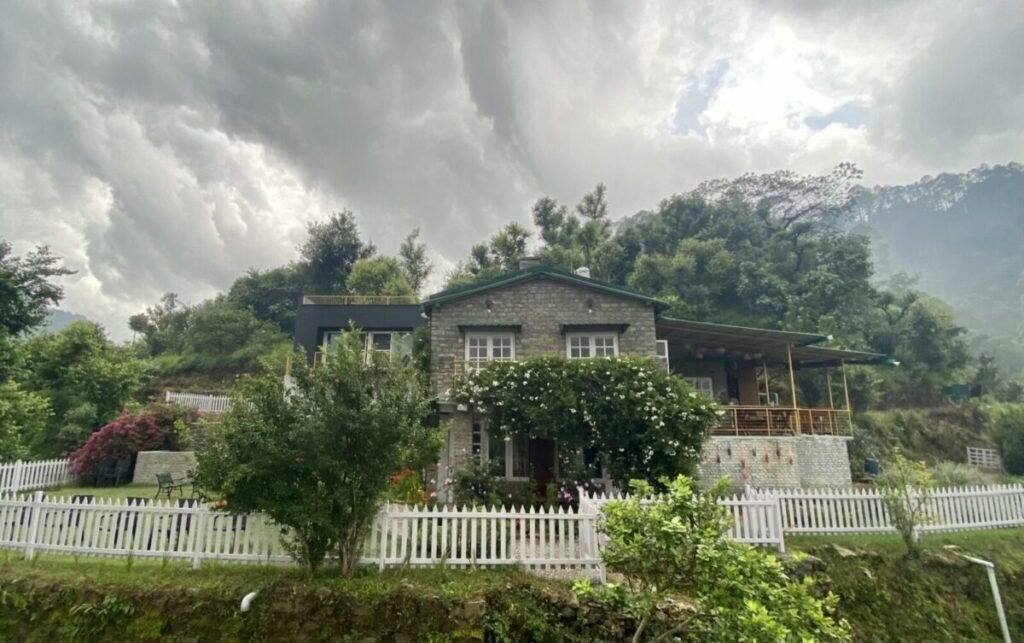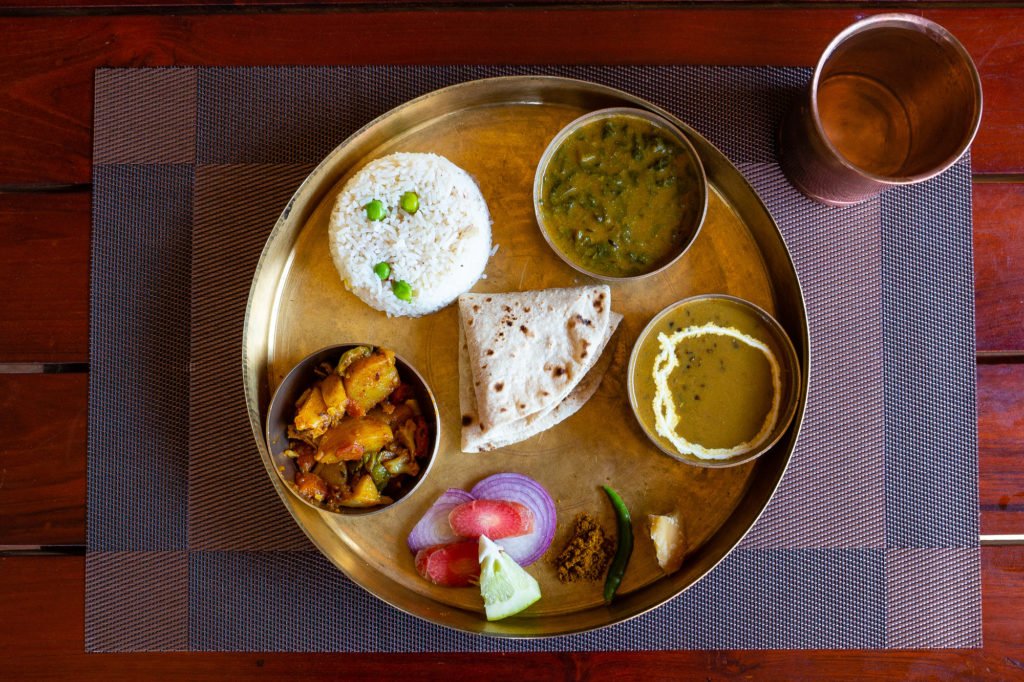Building an eco-friendly home in the Himalayas

A dream come true
Our dream of building an eco-friendly home in the Himalayas that eventually took shape as Fagunia Farmstay arose out of a mix of idealistic and mundane considerations. The idealistic considerations were to have a place where Aditi and I could experiment with ideas of sustainability and a simpler, eco-friendly, minimalist and self sufficient lifestyle. This would be our preparation for what we strongly believe will be a future where increasing climate change will profoundly transform the world as we know it and make it increasingly difficult to live the high consumption, high footprint, and urban lifestyle that most of us have gotten used to over the past few decades. The mundane part was our dream to eventually quit the 9-5 rat race and find a modest income source to take care of our living expenses. So we zeroed in on buying some farm land in Uttarakhand and set up a place where we could put all of our passions and ideas into practice.
After four years of constant searching and increasing despair of would-we-ever-find-or-afford-land-in-the-mountains, in a moment of stunning serendipity which we still marvel about, we found and fell in love with this piece of land on which Fagunia Farmstay today stands. But finding the land was probably the easiest part in retrospect. We suddenly were faced with a blank canvas on which we had to give shape to our dreams, ideals and visions.
So like the good non-profit worker bees that we were, we started by articulating our goals, divided across three phases:
Phase 1: Design, build and manage an eco-friendly homestay to enable like-minded guests to reconnect with nature
Phase 2: Convert our farm into a permaculture based, self-sufficient, zero waste, off grid farmstead for sustainable living
Phase 3: Support the arts and creative thinkers through on site residencies and short creative workshops
While we have taken some steps towards Phase 2 and 3, the rest of this article will focus on how we went about designing, building and managing an eco-friendly homestay.

Reducing our environmental impact
When we started to conceive Fagunia Farmstay as an eco-friendly home, we were sure about one thing. While we knew tourism can create much needed local employment and hopefully sustain us as well, we didn’t want to become a burden on the local environment. So from the beginning, we tried to minimize our impact on the local environment as much as possible. This we tried to do by focusing on the following five aspects:
1. Building a low impact and eco-friendly home
2. Minimizing energy usage and light pollution
3. Local sourcing of food
4. Reducing and managing waste responsibly
5. Augment local employment
Not that these were the only things that could be done to reduce our impact. Given our shoe string budget and lack of experience, we had to learn to do all of this on our own as we went along. So we made many mistakes, could not do a few things because we were simply not aware or did not have the budget for. But we are also happy that we did manage to do quite a bit as detailed below.
Building an eco-friendly home in the Himalayas
During construction, we followed the already existing contours of our site to minimize building pressure on the mountain slopes. Almost all of the stone and most of the wood used in the construction was recycled or up cycled from the earlier pre-existing house at the site or sourced from our land itself. Majority of the furniture in the villa is refurbished and antique. We kept landscaping minimal and used only local grass for our lawns to minimize watering and use of chemical fertilizers. Rain water collection and storage help with conservation of water.

Minimizing energy usage and light pollution
We kept the size of the villa’s rooms compact to retain warmth and reduce energy usage for heating. Solar water heating, solar power backup and LED lighting reduce our electricity consumption. We are also happy to share that our home is now fully solar powered!
And last but not the least, we use diffused and minimal external lighting in the night to reduce disturbance to local fauna. The added bonus of this being a chance for our guests to experience a brilliant night sky full of stars and the Milky Way!
Local sourcing of food
We serve simple, healthy but delicious Pahadi-Telugu food made using fresh vegetables and ingredients sourced from our farm and neighbouring farms or locally as much as possible. We try our best to source at least 50% of our food from our or neighboring farms or within a 5 km radius.

Reducing and managing waste responsibly
A recharging soak pit helps in on site treatment of our grey water. Our black water (sewage) waste is safely and sustainably decomposed through a recycling twin pit system onsite that converts sewage into natural fertilizer for use on our farm.
We change bed linen and towels every 4 days of a guest’s stay to minimize water and detergent usage for washing. We do not provide single use toiletries and instead provide them in refillable containers to reduce plastic waste.
Our wet waste is composted, we minimize our plastic use and safely incinerate in an on-site closed incinerator whatever plastic waste we generate. We also encourage our guests to take back any single use plastic they bring with them.
Augment local employment
While this is more of a social responsibility and doesn’t have a direct bearing on the environment, we are doing our bit for the local economy by creating employment as our staff is all local villagers we have specially trained, which also helps prevent migration to cities that is emptying many villages in the mountains.
When we threw open our doors and started hosting, we feared that our guests would not understand or like our sustainable initiatives as awareness about minimizing one’s travel footprint is still not widespread. But we are very happy that most of our guests have responded positively to our eco-friendly practices. In fact, the biggest surprise has been to see how our little guests have responded. Some of the children who stayed with us have started to reduce their use of plastic and consume less their parents later told us. We are so fortunate to be inspiring these sustainable changes in our guests.
Towards self-sufficiency and wider impact
We are far from perfect. There is a long way to go to completely minimize our footprint and become self-sufficient. We intend to do a lot more in future by going fully off grid through use of solar energy, become zero waste and source all of our vegetables and fruits from our and neighboring farms.
Another thing we want to focus on will be future proofing the sole water source that our village depends on so that it can continue to be a sustainable water source for all of us.
There are also plans to soon start artist and farming residencies, organize local clean ups and sustainability skill shares, create more employment opportunities and influence local farmers to turn our village into a model permaculture village.
It is not difficult to incorporate eco-friendly features while building or buying your dream home in the mountains or elsewhere. All it needs is a little awareness and some extra effort and commitment. One can start with the low hanging fruit like reducing energy and water usage and then look at building techniques, food sourcing and finally managing and disposing their waste. If you, like us, have dreamed of building an eco-friendly home in the Himalayas and would like to make it as sustainable as possible, please write to us and we are happy to guide as much as we can.
Socialise with us on Instagram and Facebook to follow our updates or to start a conversation. You can also visit our website to contact us or learn more about Fagunia.

I’m very happy to see ur post because today my search to find someone who can help me to build a home of my dreams to an end .pls help me if u find me genuine.
My name is SatyapriyaSrivastava resident of Allahabad (u.p ). married a girl from uttrakhand (haldwani) and have a beautiful daughter named Aditi .
Kindly help me to select a place with a good view where i can live and build a homestay for earning
Thankfully yours
My mobile no 8299841427
My wattsapp no 9695183391
Thank you Satyapriya. Glad to know that you are also looking to build a home in the mountains. I’m afraid we don’t deal in land or property sales in the mountains so can’t help you with that. But once you find your land and you are ready to build an ecofriendly home on it then please feel free to write to us at hello at fagunia dot com and we will be happy to share our suggestions.
Very Nice Concept.
I am planning for a Home stay in Uttarakhand, some of the lands are finalised.Surely would like to hear more.
Wonderful.
Productive measures and nice concept…. I hope I will contact you soon..
I am from Uttrakhand and trying to build a house at my village which is economical, self-sustainable and ecofriendly. Why i want to do that? I want to set a model house for other villages to showcase them that an economical house is possible. So, please let me know how we can build a strong and economical house within a very economical budget. I must add here that a normal house of cement and concrete will cost around 15-20 lac at least. We need a agency or architect or constructor in this region who can work on this and provide solutions.
Great to hear that Devender. Yeah, finding a good local contractor in the mountains can be quite a challenge. It took us a lot of time too. I suggest you check with locals in your area about good contractors. Costs will of course totally depend on your site, road access, slope and what kind of materials and fittings you want to use. But best way to reduce costs is to build according to the site conditions, use local materials and traditional building materials as much as possible and recycle or upcycle where possible.